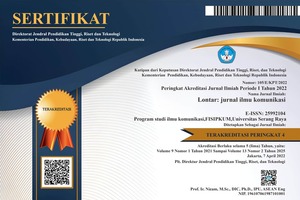Empirical Study of the Dinamics Contribution of Public Communication Based on Local Wisdom to Development
DOI:
https://doi.org/10.30656/lontar.v10i2.5604Keywords:
Communication, Public Communication, Local wisdom, Culture, DevelopmentAbstract
Communication is one of the crucial indicators in development, especially to build consensus and facilitate knowledge sharing to achieve positive change in development initiatives. One form of development communication that emphasizes the ability of communicators is public communication. In short, public communication can be interpreted as a strategic interaction to channel information, ideas, programs, presentations, data, propaganda, and many other contexts of development messages to the masses, the public, or a specific audience. This research uses a qualitative approach with a literature study to collect data. This study found that the experience of developing a geopark tourist area in Pangandaran, West Java, can be used as the first best practice as its articulation of local wisdom in public communication during the development process showed a significant effect. In this study also shows various phenomena of successful communication integration based on local wisdom and the development process in the economic field using social media, such as the Government of Kutai Kartanegara Regency, Purwakarta Regency, Sumenep Regency. It can be concluded that the use of local wisdom-based public communication is considered capable of supporting development in terms of economic, social, or cultural
References
Aelst, P., Strömbäck, J., Aalberg, T., Esser, F., de Vreese, C., Matthes, J., Hopmann, DN, Salgado, S., Hubé, N., Stępińska, A., Papathanassopoulos, S., Berganza, R., Legnante, G., Reinemann, C., Sheafer, T., & Stanyer, J. (2017). Political Communication in a High-Choice Media Environment: A Challenge for Democracy? Annals of the International Communication Association, 41. https://doi.org/10.1080/23808985.2017.1288551
Azzasyofia, M., Adi, IR, & Aritonang, AN (2020). The Role of Change Agents In Community Empowerment Using Information and Communication Technology (ICT): Case study at Kaliabu Village, Central Java. Indonesian Journal of Social Work, 3 (2).
Bakti, I., Sumartias, S., Damayanti, T., & Nugraha, AR (2018). Development of a Tourism Communication Model Based on Local Wisdom in the Pangandaran Geopark Area. Journal of Communication Studies, 6 (2), 217–230.
Dianto, I. (2022). Socio-political Barriers to Religious Village Development in Mandailing Natal District. Misykat Al-Anwar Journal of Islamic Studies and Society, 5 (2), 291–314.
Enghel, F., & Noske-Turner, J. (2018). Communication in International Development: doing good or looking good? Routledge.
Fakhrizal, Y. (2022). The Role of Regional Head Leadership on Human Resources Development Index in Nagan Raya Regency. Student Scientific Journal of the Faculty of Social & Political Sciences, 7 (1).
Hidayat, MFN, & Sugandi, KDD (2020). The Role of The Website of The Tourism Service of Kutai Kartanegara Regency as A Communication Media of Local Wisdom.
Irhamdi, M. (2017). Public communication success and failure: aspects of dakwah on the 212 movements in Jakarta and the Islamic Purification Movement in Lombok. Lentera: Journal of Da'wah and Communication Sciences, 1. https://doi.org/10.21093/lentera.v1i2.919
Kartika, T. (2016). Verbal Communication Culture and Local Wisdom: The Value Civilization of Indonesia Nation. 10 (2), 89–93. https://doi.org/10.21512/lc.v10i2.1424
Mefalopulos, P. (2003). Theory and practice of participatory communication: The case of the FAO project “Communication for Development in Southern Africa.†The University of Texas at Austin.
Nelly, N., & Permana, FA (2022). Benefits of Local Wisdom from Mawah Traditional Practices Towards Increasing Community Economic Income in Kuta Baro District, Aceh Besar Regency. Journal of Sociohumanities Kodepena (JSK), 3 (1), 100–110.
Nugraha, AR, Novianti, E., Erdinaya, LK, & Komariah, K. (2020). Public Communication with Local Culture Insight and Information Technology Based in Purwakarta. Media, Communication, Information and Communication Technology.
Ranum, GAR (2018). Communication of Extension on Fishery Resource Management Based on Local Wisdom. Journal of Fisheries and Marine Extension, 12 (2), 129–147.
RENGKUNG, CIR, TAMPI, GB, & LONDA, VY (2021). Manado City Government Public Communication in Handling Covid-19. JAP: Journal of Public Administration, VII (122).
Setra, B., Abd Razaq, & Miftahul Arifin. (2021). The Covid-19 Task Force's Public Communication Strategy: Public Communication Studies in the 2021 Lebaran Homecoming Prohibition Program. Al-Hikmah, 19 (2), 179–192.
Tambunan, J. (2022). The Role of Local Wisdom in Sharia Business Development in Padang Sidimpuan City. Iqtishodiyah: Journal of Islamic Economics and Business, 8 (2), 119–136.
Torkayesh, AE, & Torkayesh, SE (2021). Evaluation of information and communication technology development in G7 countries: An integrated MCDM approach. Technology in Society, 66, 101670.
Zuhdi, M., & Ikmal, Moh. (2022). Media And Social Construction Based on Local Wisdom in Covid 19 Disaster Management in Sumenep District., 3(1), 47-48. Journal of Faithful Pancasila.
Downloads
Published
Issue
Section
License
By submitting an article to the journal, the author(s) agree to transfer the published article's copyright to the journal, which will act as the publisher. This means the journal will have the right to publish the article in various forms, including reprints. The journal will maintain the publishing rights to the published articles.
In line with the license, authors and third parties (readers, researchers, and others) are allowed to share and adapt the material. In addition, the material must be given appropriate credit, provided with a link to the license, and indicated if changes were made. If authors remix, transform, or build upon the material, authors must distribute their contributions under the same license as the original.





